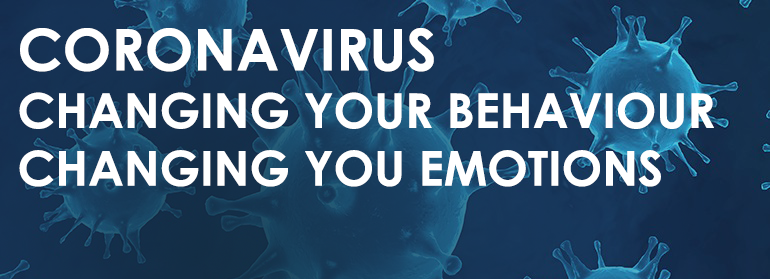
25 Mar Changing your Behaviours, Changing your Emotions
The emotional difficulty we are all currently facing is that we can’t escape the impending doom of what the coronavirus is being made out to be; it is everywhere. This constant bombardment is naturally going to activate a sense of danger within us. Once this danger is registered in our thought process, our emotions will automatically become activated. This is due to our emotions being purely designed to communicate to us that there is a problem to solve, so that we adapt and fundamentally stay alive.
Sadly, we can’t solve the coronavirus situation as quickly as any of us would like to, so instead we need to use our emotions to motivate us to take the healthy and safe precautions that not only reduce our risk of catching the illness, but make sure we are not letting them get too carried away at the same time. Our emotions really do love themselves and if they think they can maximise a situation, they will!
So, we must make a real effort to keep everything in perspective. If our emotions get carried away and we feel an unhealthy degree of anxiety and fear which doesn’t perhaps fit the real facts of this situation in a more rational reality, it could begin to change our behaviours more extremely and impact on our mental health and well-being.
We really hope these supportive resources help you at this trying time. The more informed we all are during this complex situation, armed with effective strategies, the better we will all deal with this now and in the future.
Tips on changing your behaviour and emotions
- Remember that behaviour change takes time. Don’t be too hard on yourself if you forget to wash your hands or are still touching your face more than you want to.
- Re-engage the behaviours that you want to do and use positive self talk to help you keep going
- Catch yourself noticing the behaviours you currently do or want to do and use this insight to drive the correct behaviours, being careful to not reinforce the negative behaviours that could become a problem
- Set up new behaviours. Think, “what can I do instead?” Rather than touching your face as much, you could give yourself a reassuring stroke from the shoulder to the elbow as this is a good way to reduce feelings of anxiety and offer some self-soothing reassurance to yourself. This is a positive distraction
- Be reassuring and give the facts to children and to ourselves. Reminders of the rational, more logical information we know about this condition will help reduce the domination of our emotional brain
- Try to do as many things as you can that activate positive emotions. We are going to need to make more of an effort to find new things to enjoy as many of the things we used to do have changed. Let’s get busy being creative.
- Remember that William Shakespeare is thought to have created several of his masterpieces whilst on lockdown from the bubonic plague. What could be your coronavirus legacy?


